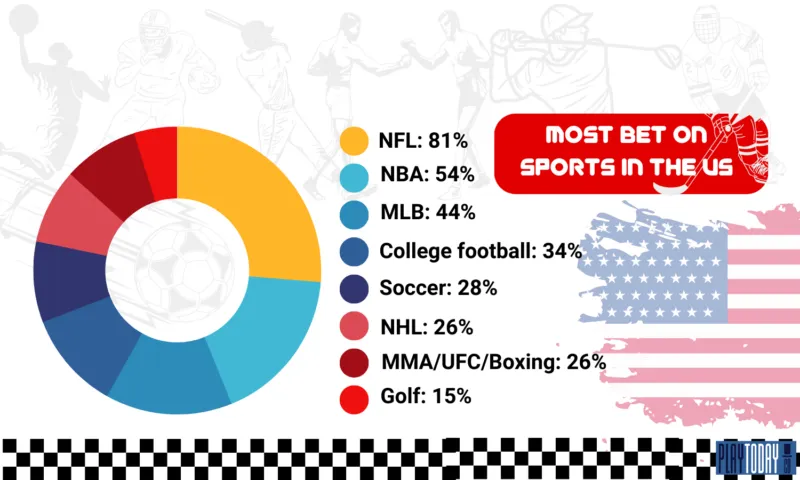Sports betting has been a popular pastime for centuries, with people placing bets on various sports events in hopes of winning big. However, the legality of sports betting has always been a contentious issue, with some countries legalizing it while others banning it completely. In recent years, the rise of online sports betting has added another layer to the conversation, leaving many wondering where exactly sports betting is legal and where it’s not.
If you’re someone who enjoys betting on sports, it’s important to know the laws and regulations around it in different parts of the world. This article will provide an in-depth look at the current state of sports betting legalization, including where it is legal and the regulations surrounding it. We’ll also explore the different types of sports betting and the impact of online betting on the industry. So let’s dive in!

1. The Current State of Sports Betting Legalization
The legalization of sports betting has been a hot topic for years, with some countries embracing it and others taking a hardline stance against it. While the laws and regulations vary from country to country, there has been a noticeable shift towards legalizing sports betting in recent years. In fact, according to the American Gaming Association, sports betting is now legal in 22 states in the US, with more states expected to follow suit in the coming years.
1.1 The United States
For many years, sports betting was illegal in most states in the US due to the Professional and Amateur Sports Protection Act (PASPA) of 1992. This law prohibited any states from authorizing or licensing sports betting, except for four states that were grandfathered in: Nevada, Delaware, Montana, and Oregon. However, in May 2018, the Supreme Court struck down PASPA, effectively making sports betting legal in all states.
Since then, 22 states have legalized sports betting, while others have proposed legislation to do the same. Each state has its own regulations and licensing requirements, but generally, sports betting is allowed in physical casinos, online through licensed operators, or both. Some states also allow for mobile betting, making it even easier for people to place bets on their favorite sports.
1.2 Europe
In Europe, sports betting has been legal and popular for many years. The UK is the largest market for sports betting in Europe, with a well-regulated industry that generates billions of pounds in revenue each year. Other countries where sports betting is legal and regulated include Italy, France, Spain, and Germany. However, there are still some countries where sports betting is illegal, such as Norway and Russia.
The regulations and laws around sports betting in Europe vary from country to country. In some places, online betting is strictly regulated, while in others, it’s completely banned. In general, European countries have a more relaxed stance towards sports betting compared to the US, which has led to a thriving industry and increased revenue for governments.
1.3 Asia
Asia has always had a love for sports and gambling, so it’s no surprise that sports betting is widely popular in this region. The laws and regulations around sports betting in Asia vary greatly, with some countries having strict anti-gambling laws and others having a more relaxed approach.
In countries like China and Japan, sports betting is mostly illegal, with only a few exceptions such as government-run lotteries. However, in countries like Macau, gambling in general is legal, including sports betting. In India, sports betting falls under the umbrella of gambling, which is regulated at the state level. This means that the legality of sports betting can vary from state to state.
2. Types of Sports Betting
There are several types of sports betting, each with its own set of rules and regulations. Here are the most common types of sports betting that you’ll come across:
2.1 Moneyline Betting
Moneyline betting is the simplest form of sports betting, where you simply bet on which team or player will win a game or event. The odds for moneyline bets are usually displayed as either positive or negative numbers, with the negative number indicating the favorite and the positive number indicating the underdog. For example, if the odds for a team are -150, it means you would need to bet $150 to win $100. If the odds are +200, you would win $200 for every $100 bet.
2.2 Point Spread Betting
Point spread betting is one of the most popular forms of sports betting, especially in American football and basketball. In this type of betting, the favorite team is given a handicap and must win by a certain number of points for the bet to be successful. The underdog, on the other hand, can lose by a certain number of points and still cover the spread. This creates more balanced odds and betting opportunities for both teams.
2.3 Over/Under Betting
Over/under betting, also known as totals betting, involves betting on the total number of points scored in a game or event. The sportsbook will set a line, and you can bet on whether the total points scored will be over or under that line. This type of betting is popular in sports like soccer, where there isn’t a point spread involved.
2.4 Prop Bets
Prop bets, short for proposition bets, are bets on specific events or outcomes within a game or event. These can range from simple bets like the first team to score a goal to more obscure bets like the color of the Gatorade that will be dumped on the winning coach. Prop bets are especially popular during big events like the Super Bowl.
2.5 Parlay Bets
Parlay bets involve combining multiple bets into one, with all bets needing to be successful for the parlay to win. The potential payout for a parlay bet is higher than that of individual bets, but the risk is also higher. This type of betting is popular among experienced bettors looking to increase their potential winnings.
3. Online Sports Betting

The rise of online sports betting has revolutionized the industry, making it easier and more convenient for people to place bets on their favorite sports. With the click of a button, you can now access a wide range of sportsbooks and betting options, all from the comfort of your own home.
3.1 Advantages of Online Betting
One of the main advantages of online betting is its accessibility. As long as you have an internet connection, you can place bets at any time from anywhere in the world. This is especially beneficial for those who don’t have access to physical sportsbooks or live in countries where sports betting is illegal.
Another advantage is the variety of betting options available online. Unlike physical sportsbooks, which may have limited options, online sportsbooks offer a wide range of sports and betting types. This allows bettors to explore different options and find the best odds for their bets.
3.2 Regulations for Online Betting
The regulations surrounding online sports betting vary from country to country. In some places, online betting is completely banned, while in others, it’s only allowed through licensed operators. For example, in the US, online betting is only allowed in states where it has been legalized and regulated.
In Europe, online betting is generally legal, but each country has its own set of regulations. Some countries require operators to obtain a license, while others have more strict rules around advertising and responsible gambling. It’s always important to research the laws and regulations in your country before engaging in online betting to ensure you’re following the law.
3.3 The Impact of Online Betting
The rise of online betting has had a significant impact on the sports betting industry. Not only has it made betting more convenient for bettors, but it has also increased revenue for governments and sports organizations. In addition, online betting has also led to a surge in live or in-play betting, where bettors can place bets during a game or event.
However, online betting also comes with its own set of challenges. The ease of access and constant availability can make it more tempting for people to develop gambling addictions. This has led to calls for stricter regulations and responsible gambling measures to be put in place by operators and governments.
4. The Future of Sports Betting
The legalization of sports betting in many countries, coupled with the rise of online betting, has ensured that the industry will continue to grow in the coming years. As technology advances, we can expect to see even more innovative ways for people to engage in sports betting, including virtual reality betting and live streaming of games.
One of the main trends in the industry is the push for more responsibility and regulations around sports betting. With the potential risks of addiction and corruption, governments and organizations are taking steps to ensure that proper measures are in place to protect both bettors and the integrity of sports events.
5. The Dark Side of Illegal Betting

While the legalization of sports betting has had numerous benefits, there is still a dark side to the industry. Illegal betting, or underground betting, is prevalent in many countries where sports betting is banned or heavily restricted. This type of betting is unregulated, leading to potential corruption and exploitation of bettors.
Illegal betting also fuels organized crime and money laundering. The lack of regulation and oversight means that criminals can use illegal betting to launder large sums of money without detection. This not only harms the integrity of sports, but it also poses a threat to society as a whole.
6. Conclusion
In conclusion, the legalization of sports betting has come a long way in recent years, with many countries now embracing it and reaping the benefits. The rise of online betting has further expanded the industry and made it more accessible to people around the world. However, it’s important for governments and operators to continue working towards responsible gambling measures and regulations to ensure the safety and integrity of the industry. As we look towards the future, it’s clear that sports betting will continue to evolve and play a significant role in the world of sports.